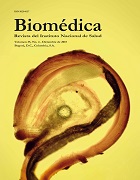Pott’s disease in a Colombian indigenous man
Abstract
Approximately 2 million people die each year from tuberculosis. One third of the world’s population is estimated to be infected with the tuberculosis bacillus, although only 5-10% will develop the disease in their lifetime. The disease progression risk depends on endogenous and exogenous factors. Indigenous communities are a high-risk group for infection and development of tuberculosis. In addition to factors such as geographical isolation, social and cultural neglect and malnutrition, susceptibility to genetic polymorphisms has been identified in them. Spinal tuberculosis is the most destructive form of the disease, which represents approximately half of all cases of skeletal tuberculosis.
The case of an HIV negative, indigenous Colombian man is presented. His diagnosis was done based on clinical and image findings, and it was confirmed with the rapid molecular assay Genotype MTBDRplus® and IS6110 PCR.The culture in solid media was negative after 16 weeks.
We briefly discuss the pathogenesis, diagnosis and treatment. Finally, we comment on some aspects of the situation of tuberculosis among indigenous Colombian communities.
Downloads
Some similar items:
- Alvaro Javier Idrovo, Historical, social and epidemiological roots of tuberculosis in Bogotá, Colombia. , Biomedica: Vol. 24 No. 4 (2004)
- Martha Patricia López, Adriana Paola Ulloa, Fabio Alberto Escobar, Tuberculosis and prison overcrowding from the perspective of social inequities in health in Colombia, 2018 , Biomedica: Vol. 42 No. 1 (2022)
- Claudia Llerena, Angélica Valbuena, Angie Paola Zabaleta, Mycobacterioses identified in the National Reference Laboratory of Colombia from 2012 to 2016 , Biomedica: Vol. 38 No. Sup. 2 (2018): Suplemento 2, Medicina tropical
- Laura Plata-Casas, Óscar Gutiérrez-Lesmes, Óscar Herrán-Falla, Tuberculosis and human immunodeficiency virus coinfection: Epidemiological situation in the department of Meta, 2010- 2015 , Biomedica: Vol. 38 No. Sup. 2 (2018): Suplemento 2, Medicina tropical
- Julio César Martínez, Claudia Llerena, Yanely Angélica Valbuena, The Importance of investigating Mycobacterium bovis in clinical samples of human origin , Biomedica: Vol. 39 No. Sp. 1 (2019): Suplemento 1, Microbiología médica, mayo
- Elizabeth Borrero, Gabriel Carrasquilla, Neal Alexander, Decentralization and health system reform: What is their impact on malaria incidence in Colombian municipalities? , Biomedica: Vol. 32 (2012): Suplemento 1, Malaria
- John-Leonardo Torres-Castiblanco, Jorge Alberto Carrillo, Daniel Hincapié-Urrego, Adriana Rojas-Villarraga, Tuberculosis in the era of anti-TNF-alpha therapy: Why does the risk still exist? , Biomedica: Vol. 38 No. 1 (2018)
- Carlos A. Torres-Duque, Claudia Díaz, Leslie Vargas, Elsa María Serpa, Walter Mosquera, María Consuelo Garzón, Graciela Mejía, Luz Mary García, Liliana Andrea González, Claudia Marcela Castro, Wellman Ribón, Disseminated mycobacteriosis affecting a prosthetic aortic valve: first case of Mycobacterium peregrinum type III reported , Biomedica: Vol. 30 No. 3 (2010)
- Adriana Rojas-Villarraga, Carlos Andrés Agudelo, Ricardo Pineda-Tamayo, Alvaro Porras, Gustavo Matute, Juan Manuel Anaya, Tuberculosis in patientes treated with tumor necrosis factor alpha antagonists living in an endemic area. Is the risk worthwhile? , Biomedica: Vol. 27 No. 2 (2007)
- Juan Gabriel Bueno-Sánchez, Jairo René Martínez-Morales, Elena E. Stashenko, Wellman Ribón, Anti-tubercular activity of eleven aromatic and medicinal plants occurring in Colombia , Biomedica: Vol. 29 No. 1 (2009)
| Article metrics | |
|---|---|
| Abstract views | |
| Galley vies | |
| PDF Views | |
| HTML views | |
| Other views | |


























